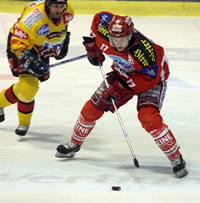The experience of Gregor Hager, a professional hockey player with KAC, the Klagenfurt team competing in a league covering Austria, Slovenia and Hungary
Gregor Hager is a Carinthian. Since childhood, he has been actively involved in ‘the Reds’ – as the hockey players of the KAC, the Klagenfurt hockey team currently playing in the EBEL (Austrian hockey league), are called. Though of Austrian nationality, he also has Slovene ancestors; there is a joke that each Carinthian has a parent of Slovene origin. Naturally, Gregor Hager, a professional hockey player since 1999, lives in Klagenfurt. And even if the hockey season ended several weeks ago, he will stay in his hometown for at least another month, the reason being the European Football Championship.
Q Right now hockey is surely not the favourite sport in Klagenfurt, is it?
A No, certainly not. If nothing else, it’s too hot now. And, of course, even in Carinthia hockey cannot compete with the European Football Championship.
Q This year has been proclaimed the European year of intercultural dialogue. The EBEL League is often mentioned as a good example of intercultural dialogue. Could you provide an example how teams from other countries have enriched the league if this is indeed the case?
A Of course it is. The most definite proof is that the number of spectators increased at all venues. It’s much more dramatic if the audience can also watch matches with foreign teams that are equal rivals to domestic ones. Of course, it’s then that patriotism comes into play, which makes it even more interesting to play against Slovene or Hungarian teams.
Q Our newspapers often announce a match between the KAC and Olimpija as a local derby. Do you also see it that way?
A As a matter of fact, the real local derby is a match between Klagenfurt and Villach, but lately we do have other derbies as well: Villach – Jesenice and Klagenfurt – Olimpija. Carinthian newspapers also label them as derbies and I’d say they’re doing the right thing. There is certain rivalry at work between these teams and, as a result, we can talk about local derbies. The spectators also consider them that way, which is good for hockey and the atmosphere.
Q Do you think that sport could set a good example and make people see that good co-operation could be also developed in other spheres?
A Sport can certainly set a good example for all kinds of spheres. The problem is that it is difficult to realise that in practice. But sport can teach us a lot of things.
Q Do you notice great differences between Slovenia and Austria once you have crossed the border?
A How can I put it? No longer. They have really become much smaller. They were very large a few years ago, just think of the infrastructure surrounding the Slovene towns that house hockey halls. In this sense, Slovenia is catching up with us. Most probably, it will invest lots of money in the following years, which is good. I have noticed that spectators and my team players have a much more positive attitude to Slovene towns as so many things have changed for the better.
Q What do you think about cross-border Euroregions?
A We can conclude with no doubt that such co-operation is a must in certain fields. For example, it would be fruitful in tourism and tourism marketing. It would go down well. We should just promote and sell it well, just think of the ‘Alpe-Adria’ idea. I’d say that at the moment everyone tends his own garden and there’s no co-operation. If they worked together instead of separately, the three regions would be much stronger. In comparison with other regions and cities, we’re relatively small. Such co-operation bring us certain advantages.
Q I’m sure that your team members also come from abroad. How do you get along? Do they keep more to themselves?
A No, hockey is a team sport. You have to stick together, each player is part of the whole, and the more we are connected, the better we understand one another, the better our results will be at the end of the season. A good case in point is Olimpija from Ljubljana. In my opinion, it was their character that made them this year’s best team in the league. They fought together and that was the main reason for their success.
Q These days, football has turned Klagenfurt in a multicultural town par excellence. Have you considered it that way even before?
A Yes, Klagenfurt has always been a multicultural town. Again, I’ll give you an example from the field of sports. The EURO 2008 Championship is not the first big sporting event organized in our town. Each year, Klagenfurt plays host to a big beach volleyball tournament, as well as an Ironman Triathlon qualifying event. Thanks to these two important sporting events and to sportsmen that take part in them, Klagenfurt is famous as a multicultural town all around the world. x
